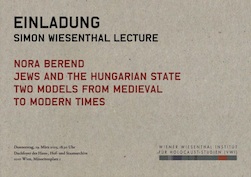Simon Wiesenthal Lectures
The Simon Wiesenthal lecture series takes place regularly every six to eight weeks and aims to present the latest research findings on the Holocaust to both a professional and a broader audience. They take into account the impressive spectrum of this discipline, the numerous questions and issues from empirical-analytical historiography to topics of cultural studies and involve young scholars as well as established academics.
Since 2007, when the Vienna Wiesenthal Institute for Holocaust Studies (VWI) was still being established, the lecture series – at that time in cooperation with the Documentation Centre of Austrian Resistance (DÖW) and the Institute of Contemporary History at the University of Vienna– has developed into the flagship of the VWI's outreach activities as a supporting element in the communication of recent academic findings in the field of Holocaust research and Holocaust and genocide studies.
For over a decade, the Austrian State Archives generously offered shelter to the Simon Wiesenthal Lectures in the roof foyer of the Haus-, Hof- und Staatsarchiv. During the challenging years of the pandemic, the lectures were held online. From autumn 2022, in order to reach out to further audiences, a new cooperation partner was found in the Wien Museum. Until the reopening of the main location at Karlsplatz, the SWL will take place at MUSA, Felderstraße 6-8, next to the Vienna City Hall.
| Simon Wiesenthal Lecture | |||
| Nóra Berend: Jews and the Hungarian State. Two Models from Medieval to Modern Times | |||
Thursday, 19. March 2015, 18:30 - 20:00 Dachfoyer des Haus-, Hof- und Staatsarchivs 1010 Wien, Minoritenplatz 1
|
|||
In Hungary, official memory and history discourses often distinguish between 'Jews' and 'Hungarians', harking back to the Horthy-era concept of the 'Christian national' state. This dichotomy clashes with modern ideas of citizenship and acts as a carrier of antisemitism. This lecture analyses the role of political authority in fostering integration or exclusion over a long time span. It begins with the attitudes of those holding political power in the Kingdom of Hungary in the Middle Ages, when the distinction between Jews and Christians was based on religious affiliation. In particular, two processes will be examined: one leading to increased integration, granting protection and rights, and the other promoting segregation, demonisation and hostility. The lecture will then focus on key moments in modern history, exploring the functions of these two contradictory but related processes. It will finally tackle the question of the role of the state in (dis)continuities between medieval exclusion and modern antisemitism.
Chair: Béla Rásky (VWI)
Nóra Berendis Senior Lecturer at the Faculty of History, University of Cambridge, UK. She is currently working on historical constructions of identity in medieval and modern Hungary. Her earlier publications include At the Gate of Christendom: Jews, Muslims and 'Pagans' in Medieval Hungary, c. 1000-c. 1300 (2001), and the co-authored Central Europe in the High Middle Ages: Bohemia, Hungary and Poland, c. 900-c. 1300 (2013).
|
|||













